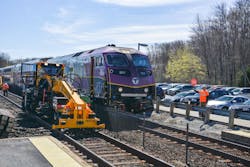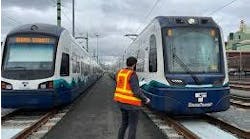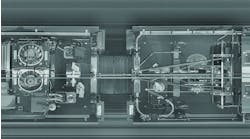FRA Approves MBTA Positive Train Control Program Extension to 2020
The Massachusetts Bay Transportation Authority announced at its Fiscal and Management Control Board meetingthat it received federal approval for its alternative schedule and sequence for implementation of itsPositive Train Control (PTC) Program. The approval, which was granted by the Federal Railroad Administration on December 19, 2018, extends the deadline for the full PTC system deployment to December 2020. Media Contact Information
PTC is a federally mandated safety control system that automatically decreases train speeds when needed, reducing train collisions and preventing human error. Work to install PTC infrastructure on the MBTA Commuter Rail network is in various stages of completion and testing on each line.
“Positive Train Control is without question the most significant investment we are making to upgrade the safety of our Commuter Rail system,” said MBTA General Manager Steve Poftak. “Thanks to our partners at the FRA, the alternative schedule is a major milestone that will ensure we can continue building on the progress we’ve made to implement PTC.”
The MBTA formally submitted to the FRA its Request for Extension in September 2018 with a revised PTC Implementation Plan submitted to the FRA in November 2018. In order to formally submit a Request for Extension from the FRA, major work was required to be completed, including the completion of wayside equipment installation (equipment totals include 194 wayside interface units, 181 wayside radios, 181 antennas, 3,097 transponders, and 223 miles of fiber optic cable), onboard equipment installation on the commuter rail fleet’s locomotives and control cars, Field Qualification Testing on the Stoughton Pilot Line, PTC training of Keolis personnel, and implementation of the PTC Configuration Management System.
Additionally, the FRA approved on October 26, 2018, the MBTA’s Revenue Service Demonstration (RSD) Application in order to place the Stoughton Line in RSD. 85 consecutive trips are required to be completed with the PTC system engaged during the RSD phase, which also allows real-world operations to take place, ensuring the training, processes, and system configurations are sufficient to support safe and regularly scheduled revenue service operations. The Stoughton Line’s RSD operation began on November 12, 2018, with 85 consecutive successful trips completed on December 17, 2018.
After reviewing these RSD results, the FRA approved “Extended RSD” on December 27, 2018, which is a prerequisite in allowing other South Side Commuter Rail lines to be placed in Extended RSD. The Stoughton Line began Extended RSD immediately on December 27 and the Fairmount Line began Extended RSD on December 29, 2018. Being in Revenue Service Demonstration means that PTC is fully deployed on those lines.
On the North Side, Field Qualification Testing, which confirms all wayside and on-board units are operating as intended, on the Lowell Line is complete. An RSD Application for the North Side Commuter Rail lines starting with the Lowell Line will be submitted to the FRA in January 2019 with an anticipated FRA approval in February 2019.
Additional next steps for the MBTA’s PTC Program include testing completion and placement of the remaining South Side Commuter Rail lines in Extended RSD. Middleborough Line testing is currently underway with continued Automatic Train Control implementation upcoming on the Worcester, Needham, and Franklin Lines. Coordination with Amtrak, CSX, and Pan Am Railways will also continue for interoperability testing.
The MBTA, together with its contractors, continues to achieve its goals in executing PTC Program Plans to deploy PTC across the entire Commuter Rail System in compliance with FRA regulations, which requires complete PTC deployment by the end of December 2020. The implementation of PTC continues to be the MBTA’s highest-priority capital program and obtaining FRA approval for the 2020 extension is a major project milestone.



